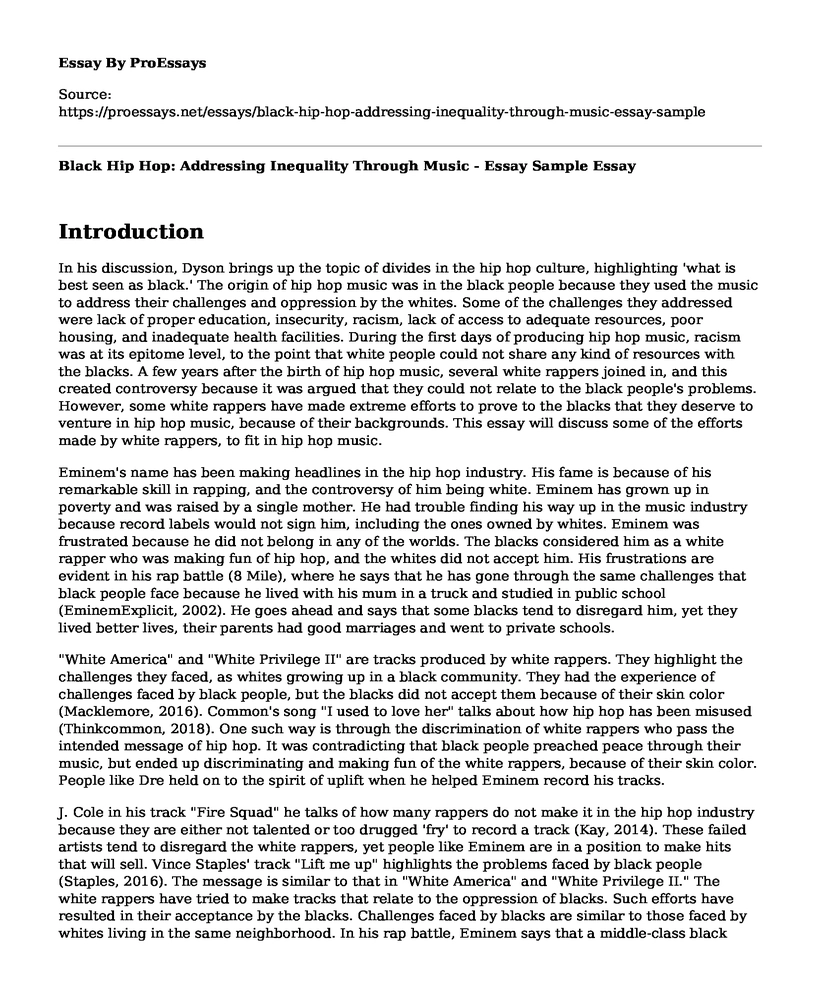Introduction
In his discussion, Dyson brings up the topic of divides in the hip hop culture, highlighting 'what is best seen as black.' The origin of hip hop music was in the black people because they used the music to address their challenges and oppression by the whites. Some of the challenges they addressed were lack of proper education, insecurity, racism, lack of access to adequate resources, poor housing, and inadequate health facilities. During the first days of producing hip hop music, racism was at its epitome level, to the point that white people could not share any kind of resources with the blacks. A few years after the birth of hip hop music, several white rappers joined in, and this created controversy because it was argued that they could not relate to the black people's problems. However, some white rappers have made extreme efforts to prove to the blacks that they deserve to venture in hip hop music, because of their backgrounds. This essay will discuss some of the efforts made by white rappers, to fit in hip hop music.
Eminem's name has been making headlines in the hip hop industry. His fame is because of his remarkable skill in rapping, and the controversy of him being white. Eminem has grown up in poverty and was raised by a single mother. He had trouble finding his way up in the music industry because record labels would not sign him, including the ones owned by whites. Eminem was frustrated because he did not belong in any of the worlds. The blacks considered him as a white rapper who was making fun of hip hop, and the whites did not accept him. His frustrations are evident in his rap battle (8 Mile), where he says that he has gone through the same challenges that black people face because he lived with his mum in a truck and studied in public school (EminemExplicit, 2002). He goes ahead and says that some blacks tend to disregard him, yet they lived better lives, their parents had good marriages and went to private schools.
"White America" and "White Privilege II" are tracks produced by white rappers. They highlight the challenges they faced, as whites growing up in a black community. They had the experience of challenges faced by black people, but the blacks did not accept them because of their skin color (Macklemore, 2016). Common's song "I used to love her" talks about how hip hop has been misused (Thinkcommon, 2018). One such way is through the discrimination of white rappers who pass the intended message of hip hop. It was contradicting that black people preached peace through their music, but ended up discriminating and making fun of the white rappers, because of their skin color. People like Dre held on to the spirit of uplift when he helped Eminem record his tracks.
J. Cole in his track "Fire Squad" he talks of how many rappers do not make it in the hip hop industry because they are either not talented or too drugged 'fry' to record a track (Kay, 2014). These failed artists tend to disregard the white rappers, yet people like Eminem are in a position to make hits that will sell. Vince Staples' track "Lift me up" highlights the problems faced by black people (Staples, 2016). The message is similar to that in "White America" and "White Privilege II." The white rappers have tried to make tracks that relate to the oppression of blacks. Such efforts have resulted in their acceptance by the blacks. Challenges faced by blacks are similar to those faced by whites living in the same neighborhood. In his rap battle, Eminem says that a middle-class black American was living a better life than a poor white.
Besides the challenges he faced as a white rapper, Eminem says that he appreciates being white because it helped him sell many tracks. He says that he would have sold half if he was black. White people purchased his albums because of his skin color, and they wanted to hear his message because he was not just like any other black rapper. On the other hand, the controversy of him being white made him famous among the blacks because they wanted to know whether or not he was real. The blacks eventually accepted him, and he stood out of all hip hop artists because he was white. "White Rappers" by Caramanica and "The Unbearable Whiteness of EmCeeing" by Allen also show how the white rapper Eminem had trouble fitting in the hip hop industry.
References
EminemExplicit (2002). 8 Mile- Ending Battles. Retrieved from https://www.youtube.com/watch?v=bhXKfqqcfiY
EminemMusic (2002). White America (Official Music Video). Retrieved from https://www.youtube.com/watch?v=RZIzD0ZfTFg
Kay, A. (2014). J. Cole- Fire Squad. Retrieved from https://www.youtube.com/watch?v=SE_vWkEBmgc
Macklemore LLC (2016). MACKLEMORE & RYAN LEWIS FEAT. JAMILA WOODS- WHITE PRIVILEGE II. Retrieved from https://www.youtube.com/watch?v=Y_rl4ZGdy34
Staples, V. (2016). Lift me Up. Retrieved from https://www.youtube.com/watch?v=bn15IvVrprw
Thinkcommon, (2018). I Used to Love H.E.R. Retrieved from https://www.youtube.com/watch?v=TrUERC2Zk64
Cite this page
Black Hip Hop: Addressing Inequality Through Music - Essay Sample. (2023, Mar 25). Retrieved from https://proessays.net/essays/black-hip-hop-addressing-inequality-through-music-essay-sample
If you are the original author of this essay and no longer wish to have it published on the ProEssays website, please click below to request its removal:
- Queen of Katwe Themes Essay
- The Poem About the Accents in the Book "A Year in the Merde"
- Effect of Architecture in Reducing Crimes - Research Paper
- Essay Example on Modern Art: Overview of Cubism
- Women Seeking Fulfilment in Societys Expectations - Essay-Sample
- Paper Example on Nostalgic Fishing Vacation on a Sunny Day
- Report Sample on Mass Communication on Marginalized Groups







